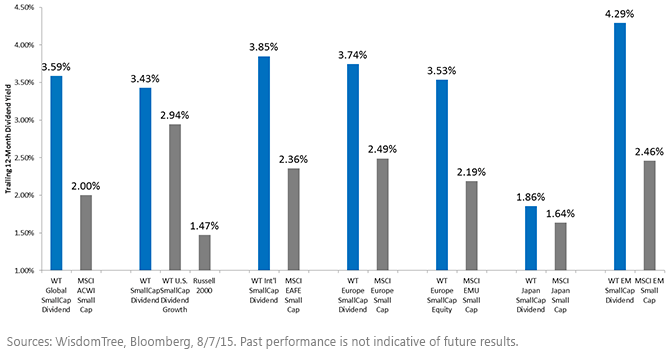Are You Forgetting About Global Small Caps for Income?


 • Look Outside the United States for Higher Yields – Whether looking at the large-cap or the small-cap indexes (displayed above), one typically sees higher trailing dividend yields outside the United States. The Russell 2000 Index had the lowest dividend yield of all the indexes examined above, and the WisdomTree Emerging Markets SmallCap Dividend Index had the highest—over 280 basis points higher, in fact. We also think it is impressive that international developed small caps can offer twice the yield of U.S. small caps, as the WisdomTree International SmallCap Dividend Index offered an advantage of over 230 basis point to the Russell 2000.
• Eurozone Small Caps Also Offer Income Advantage – It is important to note that the yield advantage of the WisdomTree Europe SmallCap Equity Index was over five times that of the German 10-year government bond and more than 3.5 times that of the French 10-year government bond. The European Central Bank is still in the very early innings of its quantitative easing program; as a result, we feel interest rates in the region could remain low for the foreseeable future.
• Japanese Small Caps Offer Advantage over Government Bonds – Japanese investors have traditionally invested a majority of their assets in cash or Japanese government bonds (JGBs), which turned out to be a profitable strategy during a period with little or no inflation. Now, with the government’s 2% inflation target, we believe investors will move out of cash and into equities to protect their purchasing power. The WisdomTree Japan SmallCap Dividend Index offered a yield advantage over four times that of the JGB yield, which we believe should be very enticing.
• Look Outside the United States for Higher Yields – Whether looking at the large-cap or the small-cap indexes (displayed above), one typically sees higher trailing dividend yields outside the United States. The Russell 2000 Index had the lowest dividend yield of all the indexes examined above, and the WisdomTree Emerging Markets SmallCap Dividend Index had the highest—over 280 basis points higher, in fact. We also think it is impressive that international developed small caps can offer twice the yield of U.S. small caps, as the WisdomTree International SmallCap Dividend Index offered an advantage of over 230 basis point to the Russell 2000.
• Eurozone Small Caps Also Offer Income Advantage – It is important to note that the yield advantage of the WisdomTree Europe SmallCap Equity Index was over five times that of the German 10-year government bond and more than 3.5 times that of the French 10-year government bond. The European Central Bank is still in the very early innings of its quantitative easing program; as a result, we feel interest rates in the region could remain low for the foreseeable future.
• Japanese Small Caps Offer Advantage over Government Bonds – Japanese investors have traditionally invested a majority of their assets in cash or Japanese government bonds (JGBs), which turned out to be a profitable strategy during a period with little or no inflation. Now, with the government’s 2% inflation target, we believe investors will move out of cash and into equities to protect their purchasing power. The WisdomTree Japan SmallCap Dividend Index offered a yield advantage over four times that of the JGB yield, which we believe should be very enticing.
Important Risks Related to this Article
Dividends are not guaranteed, and a company’s future ability to pay dividends may be limited. A company currently paying dividends may cease paying dividends at any time.
Investments focusing on certain sectors and/or smaller companies increase their vulnerability to any single economic or regulatory development.
Investments in emerging, offshore or frontier markets are generally less liquid and less efficient than investments in developed markets and are subject to additional risks, such as risks of adverse governmental regulation and intervention or political developments.


